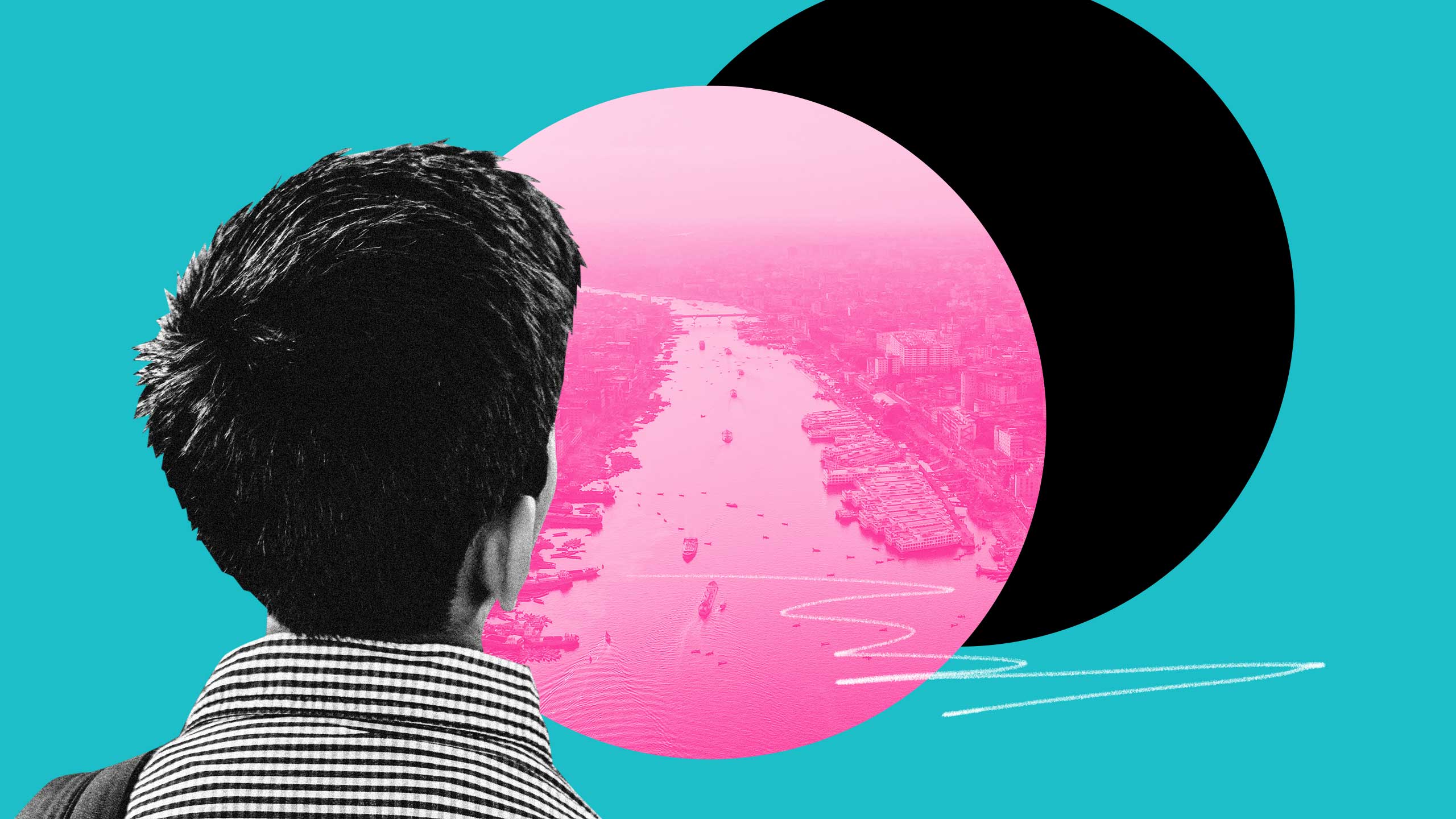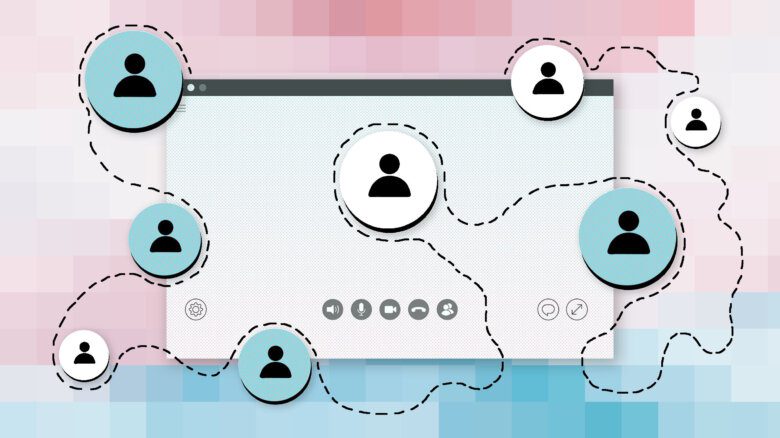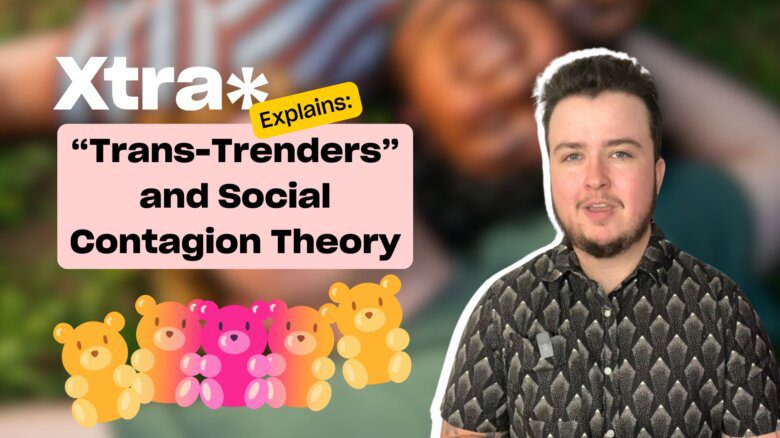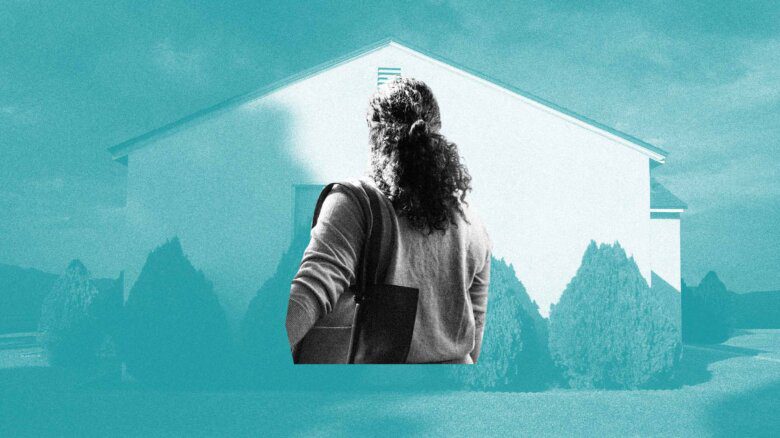Content warning: This story contains mentions of abuse, harassment and transphobia.
When I was seven years old, I knew freedom. Living as a tomboy, I knew I was different from the other girls in my grade: wearing T-shirts and shorts, never wearing jewellery or makeup, playing contact sports and refusing to grow my hair out. Those were some of the happiest and most unassuming years of my life in Shantinagar, Dhaka, Bangladesh’s cultural centre and capital city where I resided until my early teens. I genuinely felt I could live as a boy, and that one day I would become a cricket player; I was very keen to develop my skills as a bowler and bats person with the cis boys at school.
Once puberty hit, my short stint of freedom ended. My parents and school headmaster forced me to grow my hair out. They mandated that I wear skirts and shalwar kameez, a traditional tunic-trouser combination dress worn by South Asian women, to school as part of the codified uniform. I would have preferred wearing the boy’s uniform instead: a tucked-in shirt and a pair of navy blue shorts. But the mere utterance of my desire to live as a boy was met with vitriol, shame, beatings and ridicule from the elders in my life and even my own peers. I couldn’t concentrate on schoolwork, and I was bullied on a regular basis due to my gender nonconforming appearance. My grades suffered throughout middle and high school. I favoured staying at home, where I could be alone with my books and write. At the same time, I was told by my elders that I was too sensitive compared to my peers and that I needed to be strong to navigate the real world. It was hard to be vulnerable with anyone during those formative years; it was easier to be lonely and safe.
In 2010, I left home and arrived in the United States for college, studying economics and film at a Seven Sisters college. There, I was able to cultivate the emotional space I needed to discover my authentic self. I developed queer friendships and romantic relationships and got to experience queer nightlife on campus and in the city; I slowly began to believe that being queer and gender fluid were actually good things. By my 21st birthday, I started thinking that maybe I was trans.
But the possibility of being Bangladeshi, Muslim and transmasculine without any models to look up to frightened me. I’ve always wanted to blend in with my surroundings, and the idea of being an exceptional figure, let alone an inconvenience to my biological family, induced immense fear and anxiety. I convinced myself that I had to reclaim womanhood in order to heal and find wholeness. I did not have any trans friends to speak to, and the cis women friends I did have could not shed much light nor relate to the dysphoria I was grappling with. Some cis folks even told me that the trauma and sexism that I’ve faced as a gender nonconforming person could be healed through psychological means rather than medical or social transition—as if that was a solution for driving away one’s transness.
“It was life or death, and I made the decision to medically transition.”
Then I experienced loss. My queer best friend and mother passed away unexpectedly in 2014 and 2017, respectively. Those endings were a catalyst for me to live my truth: it was life or death, and I made the decision to medically transition. That meant breaking away from a large section of the Bangladeshi cis community—both straight and queer folks who were not invested in my well-being and growth. Years of self-loathing and shame led me to start hormone replacement therapy (HRT) in 2018.
At my first HRT appointment with a New York-based gender-affirming clinician, I was able to talk about my goals, wants, needs and experiences in a non-judgmental space. I was gendered correctly. For the first time, I was able to experience a medical setting where the clinician actually worked for me, and where the time and space we spent together actually belonged to me.
I realized from that first testosterone shot that I actually had no conception of who I was or what I wanted during my time in Dhaka, where surviving as a transmasculine and queer person seemed impossible. I had wasted years of my life trying to fix a part of me that was never broken and suffered needlessly in the process. And I was far from the worst off, growing up among the country’s upper-middle class and urban population. Even today, working-class trans men from rural regions of Bangladesh continue to face unconscionable levels of cruelty, neglect and isolation. Such occurrences epitomize the acute struggle for Bangladeshi transmasculine folks.
The popular understanding of the term “transgender” in Bangladesh is koti or hijra, transfeminine people or people with feminine traits. In 2013, the government of Bangladesh decided to recognize the Hijra community, namely to start categorizing them as a “third gender.” This recognition aimed to help this community acquire rights, support better identification methods in government documents and help trans folks secure employment. It was a legislative victory, yet there remain several loopholes with third-gender documents that make it difficult for transfeminine folks to gain material or monetary access to the resources they have been promised.
While the third-gender decree focused on transfeminine and Hijra people, it did not include trans men. As a result, there is rarely any literature about the abuses we face, and no mechanism in place for our legal gender recognition. We are not considered part of the country’s trans community. Medical providers and legal entities refuse to acknowledge the reality of transmasculine experiences and dismiss our lives as illegible and unworthy of care. Should a transmasculine person go to a medical setting, patriarchal ideas about childbirth and preserving the sacredness of womanhood end up obstructing our access to life-saving hormones and gender-affirming surgeries. This lack of a legal recognition compounds the isolation and insecurity trans men feel.
Hormone therapy treatment is a life-changing experience for those who are able to safely access it—I can attest to that. But despite the joys of my transition journey, I continue to experience a form of survivor’s guilt for being on this side of the world, since such compassionate health care is not readily accessible to trans folks in Dhaka.
While there has been a shift in Bangladesh’s LGBTQ+ activism both within and outside of the homeland, a large majority of activism in the country has relied on the leadership of cis queer people—ranging from the activities conducted by Boys of Bangladesh to the launch of the cisgender lesbian comic book character Dhee. But the Bangladeshi community is still majorly unwelcoming to trans people. From debates around access to health care and economic justice to judgment fuelled by manipulated versions of Islamic scriptures, there are many factors at play as to why we are not present in community spaces. There has been a dearth of Bangladeshi trans-led initiatives or authorship that have been witnessed by the nation, let alone by a global audience (excluding the handful of articles that oscillate between transfeminine folks’ tokenistic achievements and their abject misery).
For activists, there’s always the threat of violence. In 2016, activists Xulhaz Mannan, a cis gay man, and Mahbub Tonoy, a pansexual non-binary person, were murdered in Mannan’s apartment. The pair both worked on Roopbaan, a Bangladeshi LGBTQ+ magazine, and were outspoken advocates for the queer community. Their murders only exacerbated the climate of fear and insulation that trans men in Bangladesh experience on a daily basis.
“Unlike in a Western context, LGBTQ+ visibility has severe costs in Bangladesh.”
Meanwhile, the strong sense of sisterhood among trans femmes and Hijras is nonexistent for most transmasculine folks. Unlike in a Western context, LGBTQ+ visibility has severe costs: being open about one’s sexuality, especially trans identity, does not guarantee one’s safety; rather, it serves to promote social backlash and even worse, violence. The performative, oftentimes toxic expectations of South Asian masculinity are pervasive among transmasculine folks’ sense of identity in Bangladesh. We rarely travel in groups or form deep intimate bonds, and so we’re often on the receiving end of transphobic violence in a majority of public spaces. Coupled with the lack of spaces for community-building, the political mobilization of the transmasculine community continues to be minimal.
Outside of Bangladesh, I struggled with developing intimacy and trust in my adult relationships for a significant period of time. This is due to myriad mental health and self-worth issues that arose from the systems that shaped me as a trans youth in Bangladesh. Simple check-ins were not enough—I needed a more aggressive approach to healing my wounds. I needed emergency intervention and medication to stabilize me and long-term therapy to get me out of acute crises. I also needed community, chosen family and professional fulfillment to allow me to thrive. For the most part, these are things that only systems can provide, not individuals. And the systems in Bangladesh have failed—and continue to fail—most queer and trans folks. This is not to say Western societies have better systems of care, but more so that I managed to find small trans-affirming pockets in America where it was possible to have authentic conversations about my psychological well-being.
Increasingly, the burden of challenging the gender binary rests on trans folks. Bangladeshi cisgender folks are rarely critical of their own participation in the perpetuation of cisheteropatriarchy and homonormativity. The gatekeeping of trans identity, or the policing of who qualifies as a “real” transgender person by an external cisgender authority, does not merely affect gender-variant people. Rather, it serves to define and police the idea of gender itself. The simplest method of gatekeeping within the homeland occurs when state officials decide if a transgender person is “real” or not by examining our bodies. This dehumanizing “medical test” investigates whether an individual is a woman or not where the presence of any indication of a male genitalia excludes one from the category of “woman.”
How then, can the larger Bangladeshi cisgender community commit to elevating trans lives? Transphobic Bangladeshis continue to say they want to accept us as we are, but they want us to reject who we are and will only accept their palatable—cis-passing, able-bodied, English-educated—versions of us. Such actions do not form genuine solidarity and continue to be harmful and destructive for the self-determination that trans Bangladeshis deserve. In order to bring about meaningful change, Bangladeshi cis folks across all class backgrounds must realize that their liberation is bound up with the liberation of the trans people who are living among them. Only when we’re able to acquire the rights and humanity for the most marginalized will everyone be free. Instead of equating Bangladeshi transness with victimhood, ask us what we want and give us the tools and financial resources to tell our own stories and build our own safe spaces.
Two years ago, I wrote a letter to two close relatives of mine, an elderly aunt and uncle, to assure them I intend to live—not just a shell of a life, but a rich, fulfilling one. I was scared of how they would react to my gender transition, but I felt compelled to write the letter because my relationship with them is based on mutual trust, love and boundaries. I am grateful for being able to hold on to a select few members of my biological family who have brought me joy on some of my darkest days. My aunt and uncle reacted rather positively to the letter and continue to shield me from the backlash of other family members out of an abundance of caution and care.
“I am certain that before we leave this world, we will make things better for the transmasculine Bangladeshis who will come after us.”
While many Bangladeshi family and community spaces do continue to reject or exploit us, I leave my Bangladeshi transmasculine siblings with these final thoughts: prioritize the people and spaces that bring you joy. As trans folks, most of our lives are taken from us due to the daily social, emotional and political violence we are made to endure. Our joy gets lost in these everyday patterns of survival. I am also certain that before we leave this world, we will make things better for the transmasculine Bangladeshis who will come after us. We will continue to work and foster joy until there are no longer first and onlys. None of our battles are new; they have deep-rooted histories, and we need to unearth the stories of those who’ve trudged our paths before us. Upon excavating these stories, it becomes incumbent upon all of us to signal to future generations of trans folks that they deserve to be cared for. Ultimately, our Bangladeshi community will never truly be free until the most marginalized among us have full control over our narratives and livelihoods.

 Why you can trust Xtra
Why you can trust Xtra


